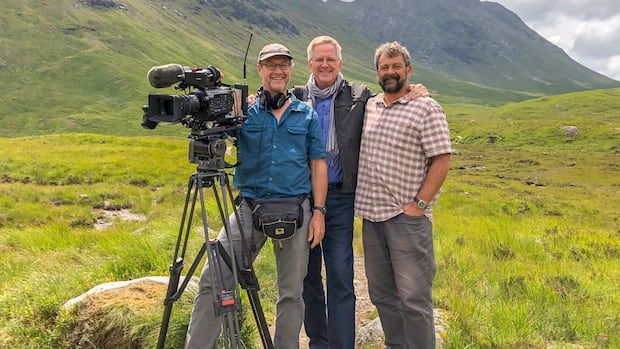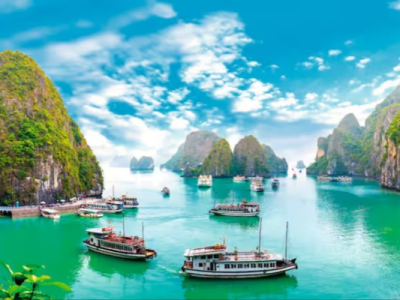The Current24:19The hippie trail trip that changed Rick Steves’ life
Rick Steves never set out to be a travel guru.
In the late ’70s he had just graduated from university and was starting a career as a piano teacher. He felt the call of the “Hippie Trail” — an overland journey from Istanbul to Kathmandu — and set out with a friend to travel it before getting on with his new life.
But something about the long, cross-border bus rides and nights spent sleeping on the floor, surrounded by amateur poets, philosophers and musicians, sucked him in.
“I was entering into a world where not a single soul knew I existed and I didn’t know a single soul. We had no internet, you know, and we had no safety net. Our parents couldn’t come in and rescue us,” Steves told The Current host Matt Galloway.
He loved the journey so much that not long after, he gave up piano teaching to lead tours, write travel guides and, eventually, host his own TV show. Steves’ mission has been to help travellers un-bubble wrap their trips by embracing that same adventurous spirit he first encountered on the Hippie Trail.

“To this day, my colleagues and I joke that our mission is to equip and inspire Americans to venture beyond Orlando,” Steves said.
Steves spoke with Galloway about his new book On the Hippie Trail, detailing that first journey, and how travelling can be a force for good in the world.
This is a new book, but you wrote it back in 1978. It’s from your journals … What was it like to go back and read?
It’s some kind of freaky anthropological dig into the past. I’m looking at a 23-year-old me. I’m exactly three times that [age] right now, 69. It was me before I was a travel writer … and I was just on vacation in the summer.
I have not travelled in such a footloose and fancy free way since because I’ve got the burden — the wonderful burden — of running my business and updating my guidebooks and leading my tours and making my TV shows. But on that trip, it was purely a chance just to get out there and get to know the world.
It was travel with abandon … Celebrating the idea that you can learn more about your home and yourself sometimes by leaving it and looking at it from a distance. And I have all these kind of philosophical approaches to travel now. But back then, there was no philosophy that I knew of. I was just a green, naive kid with a few bucks in my money belt … going for the end of the rainbow, as far as hippies were concerned. And that was Kathmandu.
It was 1978, which was the last year of the Hippie Trail. After that, the Shah fell and [the] Ayatollah came in and Iran became a theocracy. And the Soviet Union invaded Afghanistan, so the war broke out. [It’s a] storm of weird circumstances that enabled me to have this book.
LISTEN | Traveller’s mindset is what’s getting Rick Steves through the pandemic
Day 611:33Traveller’s mindset is what’s getting Rick Steves through the pandemic
What do you think you were looking for when you went on the trip?
I wanted to broaden my world. Maybe that’s it. I don’t know exactly if I knew what I was looking for at the time. But I realised through my travels that the world is a big and diverse place.
And I wanted to meet people that I wouldn’t meet at home. And I certainly did. I wanted to rough up my ethnocentrism. I wanted to rearrange my cultural furniture. I wanted to be humbled. I wanted to be more of a citizen of the planet.
We struggled with, “Are we doing the right thing? We could turn around and go back to the Greek islands and hang out with all the kids … and just party.” But we wanted to experience this. And strangely, I had never been to India, but crossing the border into India after going over the Khyber Pass out of Afghanistan, it was like coming home … I just absolutely loved it.
And in augmenting it with marijuana and with hanging out with people that were so interesting and philosophical and poetic and musical from all over the world, it was a dream come true trip.

Do you get something more from the travel when the journey is difficult?
Nowadays most of us fly from capital city to capital city. I really like going across borders. And the closer to the ground you are, the more you experience, the less money you’re spending … the more you’re becoming a temporary local.
I like this idea of being a cultural chameleon when I cross the border. I drink and I eat what the locals are drinking and eating. I try to morph.
[You said that] you can travel as a tourist, a traveller, or a pilgrim. What does it mean to be a traveller? Because I think we know what it means to be a tourist, right?
Yeah, a tourist is bucket lists and frequent flyer miles and fun in the sun and just, you know, having a good time, going to Disneyland. I like that. There’s no problem with that. But that’s a la-la land.
To be a traveller, it’s to get out of your comfort zone and to learn. To me, it’s an opportunity. And I think given the challenges we’re confronting in the world today, I think it’s important for us to travel … in a way that broadens our perspective.
When we travel, I believe we realise that the world is a good place. It’s filled with wonderful people, it’s filled with love and [we] come home with that notion. And we can then get busy and work on the problems that we need to work on.

The year that you went on the Hippie Trail was the last year that anybody could do that because of revolution and war and it changed that part of the world forever. But you say that anyone can still do this. What do you mean by that?
When I think of this experience, Matt, it’s not a 23-year-old Rick Steves, in 1978, travelling from Istanbul to Kathmandu. I mean, that’s physically what it is. But the Hippie Trail is somebody coming of age and deciding they want to … have a broad perspective that travel can give you, and let that make their life more full and with more colours and with more options and with more depth.
You can have your hippie trail experience today in 2025, man or woman, old or young, you can get out there and travel with that youthful spirit, travel with an appetite for serendipity. And when serendipity knocks, you say, “yeah.”










